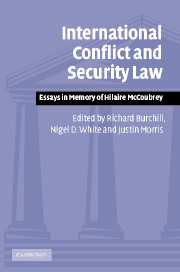Book contents
- Frontmatter
- Contents
- Biography of Hilaire McCoubrey
- Notes on contributors
- Foreword: There are men too gentle to live among wolves
- List of abbreviations
- 1 Hilaire McCoubrey and international conflict and security law
- 2 The development of operational law within Army Legal Services
- 3 Reflections on the relationship between the duty to educate in humanitarian law and the absence of a defence of mistake of law in the Rome Statute of the International Criminal Court
- 4 Superior orders and the International Criminal Court
- 5 Command responsibility: victors' justice or just desserts?
- 6 The proposed new neutral protective emblem: a long-term solution to a long-standing problem
- 7 Towards the unification of international humanitarian law?
- 8 Of vanishing points and paradoxes: terrorism and international humanitarian law
- 9 What is a legitimate military target?
- 10 The application of the European Convention on Human Rights during an international armed conflict
- 11 Regional organizations and the promotion and protection of democracy as a contribution to international peace and security
- 12 Self-defence, Security Council authority and Iraq
- 13 International law and the suppression of maritime violence
- 14 Law, power and force in an unbalanced world
- Bibliography of Hilaire McCoubrey's work
- Index
9 - What is a legitimate military target?
Published online by Cambridge University Press: 17 July 2009
- Frontmatter
- Contents
- Biography of Hilaire McCoubrey
- Notes on contributors
- Foreword: There are men too gentle to live among wolves
- List of abbreviations
- 1 Hilaire McCoubrey and international conflict and security law
- 2 The development of operational law within Army Legal Services
- 3 Reflections on the relationship between the duty to educate in humanitarian law and the absence of a defence of mistake of law in the Rome Statute of the International Criminal Court
- 4 Superior orders and the International Criminal Court
- 5 Command responsibility: victors' justice or just desserts?
- 6 The proposed new neutral protective emblem: a long-term solution to a long-standing problem
- 7 Towards the unification of international humanitarian law?
- 8 Of vanishing points and paradoxes: terrorism and international humanitarian law
- 9 What is a legitimate military target?
- 10 The application of the European Convention on Human Rights during an international armed conflict
- 11 Regional organizations and the promotion and protection of democracy as a contribution to international peace and security
- 12 Self-defence, Security Council authority and Iraq
- 13 International law and the suppression of maritime violence
- 14 Law, power and force in an unbalanced world
- Bibliography of Hilaire McCoubrey's work
- Index
Summary
Military objectives
It is evident from media reports of recent conflicts, from the letter pages of the newspapers and even from the pronouncements of politicians, that people are not very well informed about what may legitimately be attacked in an armed conflict. In fact, the law of armed conflict is quite clear and simple: it permits attacks on military objectives; it prohibits attacks on civilian persons and civilian objects. The law also recognizes that attacks on military objectives are likely to cause incidental loss or damage to civilians or civilian property, and so requires attacks to be cancelled, suspended or replanned if it becomes apparent that the incidental loss or damage is going to be out of proportion to the military advantage expected. This is known as the rule of proportionality.
Since the law limits attacks to military objectives, it is vital to know what these are. Military objectives are defined as follows:
In so far as objects are concerned, military objects are limited to those objects which by their nature, location, purpose or use make an effective contribution to military action and whose total or partial destruction, capture or neutralization, in the circumstances ruling at the time, offers a definite military advantage.
This definition is limited to objects so does not cover areas of land, personnel or intangible things like morale, the legitimacy of attacking which falls to be determined according to the laws and customs of war.
- Type
- Chapter
- Information
- International Conflict and Security LawEssays in Memory of Hilaire McCoubrey, pp. 160 - 184Publisher: Cambridge University PressPrint publication year: 2005
- 1
- Cited by



